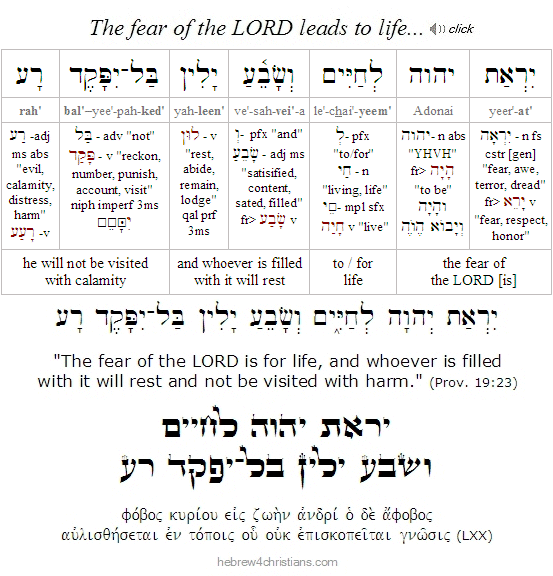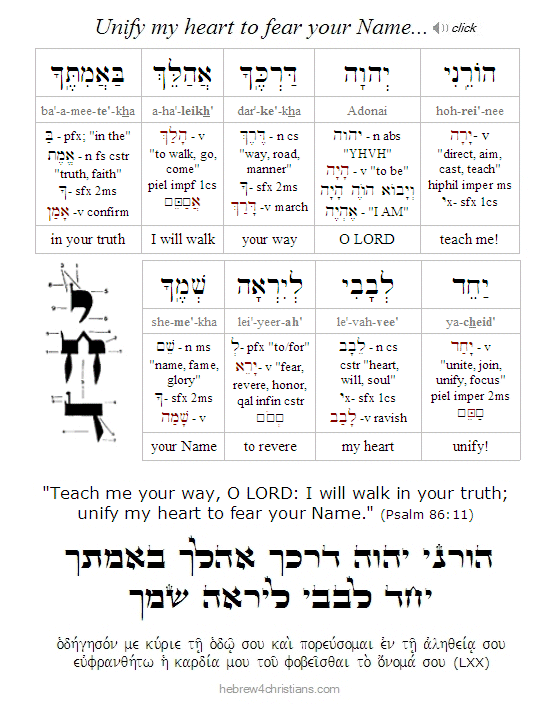|
Recall that before the revelation at Sinai God instructed Moses to set a "boundary" (i.e., hagbalah: הגבּלה) around the mountain with the stern warning that whoever would transgress the imposed limit would die (Exod. 19:12). But why did the LORD command this distance from the people at the time of such intense revelation? Why, for that matter, were God's first words to Moses, "do not come closer" (אַל־תִּקְרַב הֲלֹם) when he encountered the LORD before the burning thornbush (Exod. 3:5)? In response to such questions the sages have said that there is a fundamental "dialectic" or tension at the core of our connection with God. On the one hand God is utterly holy, sacredly separate, infinitely transcendent, and entirely beyond our understanding, while on the other hand God is entirely present within creation, upholding it and providentially sustaining it, and who is near to all who sincerely call upon him (Psalm 145:18). God is both Elohim (אלהִים) - the Master of the universe and ruler of all possible worlds -- the sole Creator (הַבּוֹרֵא) and the only true Judge and moral authority (הֲשֹׁפֵט הָאֲמִתִּית), yet he is also YHVH (יְהוָה), the source of our breath (Gen. 2:7; Num. 16:22), the compassionate Savior (הַמוֹשִׁיעַ), the intercessor (מַפְגִּיעַ), the Redeemer (הַגּוֹאֵל), the Healer (הַמְרַפֵּא), and Lover of our souls (חובב נשמתנו). God is both fully holy (separate) yet his glory pervades and fills the world (Isa. 6:3).
The dialectic between God's transcendence (sacred otherness) and immanence (inherent presence) evoke different existential responses within the heart of faith. The transcendence of God evokes emotions of fear, reverence, respect, honor, and profound awe, while the immanence of God evokes emotions of love, closeness, intimacy, comfort, safety, and so on. The Torah juxtaposes both heart attitudes by saying, "And now, Israel, what does the LORD your God require of you, but to fear (לירוא) the LORD your God, to walk in all his ways, to love (לֶאֱהֹב) him, to serve the LORD your God with all your heart and with all your soul" (Deut. 10:12). In this summary statement of what the LORD requires of us, the fear of the LORD (i.e., yirat Hashem: יִרְאַת יהוה) is mentioned first. First we must learn to properly fear the LORD and only then will we be able to walk (לָלֶכֶת) in His ways, to love (לְאַהֲבָה) Him, and to serve (לַעֲבד) Him with all our heart and soul. But again, the requirement to fear the LORD your God (לְיִרְאָה אֶת־יהוה) is placed first in this list...
Indeed, "the fear of the LORD is said to be the beginning of wisdom (רֵאשִׁית חָכְמָה)." Without fear of the LORD, you will walk in darkness and be unable to turn away from evil (Psalm 111:10; Prov. 1:7; 9:10; 10:27; 14:27, 15:33; 16:6). The Scriptures plainly declare that "the fear of the LORD leads to life" (יראת יהוה לחיּים, lit. "is for life"):
יִרְאַת יְהוָה לְחַיִּים
וְשָׂבֵעַ יָלִין בַּל־יִפָּקֶד רָע
yee·rat · Adonai · le·cha·yeem
ve·sah·vei'·a · yah·leen · bal-yee·pah·ked · rah'

"Fearing the LORD leads to life, the one who does
so rests satisfied and will not be visited with harm." (Prov. 19:23)
Hebrew Lesson
Proverbs 19:23 Hebrew reading:
 |
The word translated "fear" in many versions of the Bible comes from the Hebrew word yirah (יִרְאָה), which has a range of meaning in the Scriptures. Sometimes it refers to the fear we feel in anticipation of some danger or pain, but it can also can mean "awe" or "reverence." In this latter sense, yirah includes the idea of wonder, amazement, mystery, astonishment, gratitude, admiration, and even worship (like the feeling you get when gazing from the edge of the Grand Canyon). The "fear of the LORD" therefore includes an overwhelming sense of the glory, worth, and beauty of the One True God.
According to the classical sages, there are three "levels" or types of yirat HaShem, or the fear of the LORD. The first level is the fear of unpleasant consequences or punishment (i.e., yirat ha'onesh: יִרְאַת הָענֶשׁ). This is perhaps how we normally think of the word "fear." We anticipate pain of some kind and want to flee from it.
The second type of fear concerns anxiety over breaking God's law (sometimes called yirat ha-malkhut: יִרְאַת הַמַּלְכוּת). This kind of fear motivates people to do good deeds because they are afraid God will punish them in this life (or in the world to come). This is the foundational concept of karma (i.e., the cycle of moral cause and effect). As such, this kind of fear is founded on self-preservation, though in some cases the heart's motive may be mixed with a genuine desire to honor God or to avoid God's righteous wrath for sin (Exod. 1:12, Lev. 19:14; Matt. 10:28; Luke 12:5). God does not wink at evil or injustice, and those who practice wickedness have a genuine reason to be afraid (Matt. 5:29-30; 18:8-9; Gal. 6:7-8). God is our Judge and every deed we have done will be made known: "Every man's work shall be made manifest: for the day shall declare it, because it shall be revealed by fire; and the fire shall try every man's work of what sort it is" (1 Cor. 3:13). We should tremble before the LORD because we are fully accountable for our lives. We should fear sin within our hearts. Our actions matter, and we should dread the thought of angering God. There will be a final day of reckoning for us all...
The Chofetz Chaim warned that even though the fear of God's punishment may deter us from sin in the short run, by itself it is insufficient for spiritual life, since it is based on an incomplete idea about God. It sees God in terms of the attributes of justice (אלהִים) but overlooks God as the Compassionate Savior of life (יהוה). After all, if you are avoiding sin only because you fear God's punishment, you may clean the "outside of the cup" while the inside is still full of corruption... Or you might attempt to find rationalizations to excuse yourself from "legal liability." You may appear outwardly religious (i.e., "obedient," "Torah observant," "righteous"), but inwardly you may be in a state of alienation and rebellion. "The heart is deceitful above all things..." (Jer. 17:9).
The third (and highest) kind of fear is a profound reverence for life that comes from rightly seeing. This level discerns the Presence of God in all things and is sometimes called yirat ha-rommemnut (יִרְאַת הָרוֹמְמוּת), or the "Awe of the Exalted." Through it we behold God's glory and majesty in all things. "Fearing" (יִרְאָה) and "seeing" (רָאָה) are linked and united. We are elevated to the level of reverent awareness, holy affection, and genuine communion with God's Holy Spirit. The love for good creates a spiritual antipathy toward evil, and conversely, hatred of evil is a way of fearing God (Prov. 8:13). "For everyone who does wicked things hates the light and does not come to the light, lest his works should be exposed. But whoever does what is true comes to the light, so that it may be clearly seen that his works have been carried out in God" (John 3:20-21). In relation to both good and evil, then, love (אַהֲבָה) draws us near, while fear (יִרְאָה) holds us back.
The complex tension between fearing and loving God expresses both God's distance and nearness -- both relations are expressed in the Scriptures, and therefore both are to be affirmed. We must honor and revere God as our Creator and Judge, conscious of the distance implied in his power, glory, holiness, and perfections, yet we draw close to Him as our Savior, our healer, and our friend...
We encounter this tension when we come to the cross of the Messiah as well, for there we see the severity of God's judgment for sin based on his absolute holiness (transcendence) while simultaneously seeing the incalculable depths of God's love as he offers himself in exchange for our condemnation (immanence). At the cross we see how Yeshua both suffered and died on our behalf, yet the dark cloud covered the place in the most intimate moments of passionate intercession for our deliverance.
We must cultivate awe in our hearts by consciously remembering the LORD's Presence and salvation. As King David said:"I have set the LORD always before me; because he is at my right hand, I shall not be shaken" (Psalm 16:8). Note the paradoxes involved in this verse. We set the LORD always before us (shiviti Adonai lenegdi tamid) so that we will not be shaken, and yet we are to revere the LORD with fear and trembling (Psalm 2:11, Phil. 2:12). Likewise, we draw near to the LORD God as the Righteous Judge - in fear and trepidation - yet in the full confidence of His love as demonstrated by the Cross of Yeshua. God is a Consuming Fire, but also our Comforter.
 |
In the Talmud it is written, "As to the one who reveres God, the whole world was created for that person's sake. That person is equal in worth to the whole world" (Berachot 6b). This might seem to be hyperbole, but it reminds me of the Chassidic tale that says says that every person should walk through life with two notes, one in each pocket. On one note should be the words bishvili nivra ha'olam (בִּשְׁבִילִי נִבְרָא הָעוֹלָם) -- "For my sake was this world created," and on the other note the words, anokhi afar ve'efer (אָנכִי עָפָר וָאֵפֶר) -- "I am but dust and ashes."
Similarly, it is evident that both senses of yirah are called for within our hearts. We must fear the LORD as our Judge and yet be in awe of the cost of His Redemption. We draw close to God while regarding Him with exalted reverence. We should constantly fear sin. We should be afraid of stumbling and dishonoring God with our lives. We should be vigilant, alert, awake, mindful, and attentive to the Presence of the LORD in all things. Sin "misses the mark" regarding our high calling and status as God's children.
The hagbalah or "boundary" between God and man helps us maintain balance in our relationship with the LORD. We must guard against undue familiarity and presumption before God lest we forget the honor and glory of the Majesty on High, yet we must not view God as unreachable, inaccessible, or impassive to our condition lest we forget the compassion, mercy, and the fiery passion of his love for us...
Finally, the boundaries God gives us are meant to help us know our place in his plans. We are to know before Whom we stand and to refrain from lofty speculations or spiritual expressions that inspire us to disregard and therefore transgress the distinction between the creature and the Creator. Just as Israel was to stay at the foot of the mountain to receive revelation, so we must stay at the foot of the cross, not seeking other visions or wonders beyond which God himself discloses. We must be careful in our zeal not to offer "strange fire" (אֵשׁ זָרָה) as did the sons of Aaron in their exhuberance (Lev. 10:1). Again, it is a balance - spirit and truth - as we desire to draw near to the Divine Presence yet are humbled and in awe before the glory and greatness of God....
Hebrew Lesson
Psalm 86:11 Hebrew reading:
 |
|





